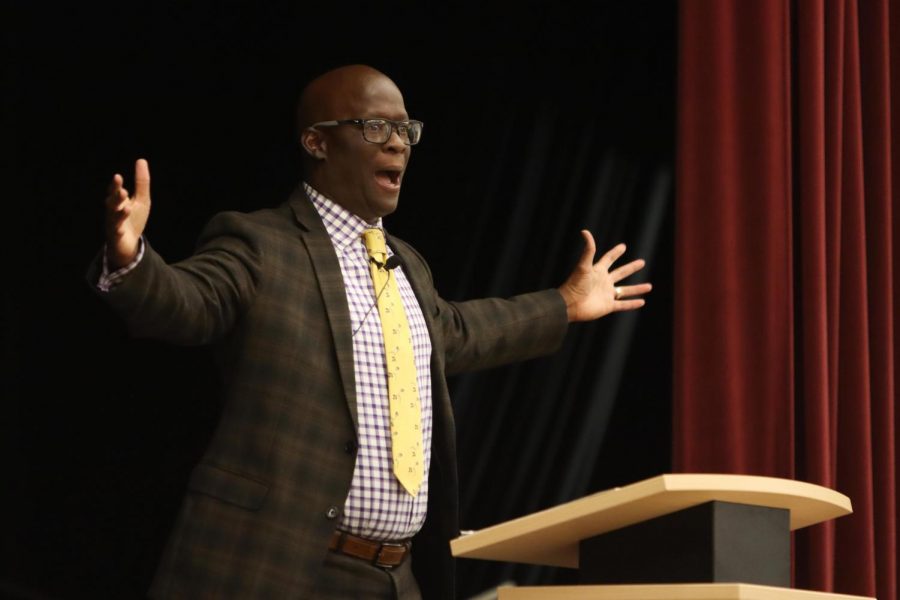Celebrating the work and heart of MLK
Speaker challenges younger generations to “focus on working with those who want to do better”
Guest speaker Dr. Eddie Moore Jr. speaks to attendees about the importance of MLK and his goals for change in the future.
January 27, 2020
On Wednesday, Jan. 22 the University of Wisconsin-Whitewater celebrated the life and work of Dr. Martin Luther King Jr., one of the most prominent leaders of the Civil Rights Movement. Students, faculty and staff gathered to honor and discuss how King’s work influenced the world we know today, and how much farther we still have to go.
Dr. Eddie Moore Jr., director of The Privilege Institute and the National White Privilege Conference, was the keynote speaker for the 33rd Annual MLK Commemorative Event. He stressed the importance for younger generations to reflect on how we have grown as a nation since King.
“I’m excited to present the question to young people, college students especially: have we been progressing?” Moore said. “How are we doing based on what they know about MLK and that time?”
Moore looks forward to hearing from college students and younger age groups about their own opinions and where they see room for growth today.
“No matter how they answer that question, how can we do better? What’s their future going to look like, and what’s going to be their role in it?” he said. “That’s why I’m happy to be here – to get a sense from young people of how they feel things are right now, how we can get better and what role they’re going to play.”
The event began with a reading of “King Consciousness” by Twin Soul Poets, read by Leracha Simon, a graduate assistant for University Housing.
“He was a king who won his battles with peace and swung arrows with his speech. He captivated the kingdom as he poured his enchanting molasses drawl over their eager ears.”
Following Simon’s reading, Moore gave his lecture, drawing the audience in with imagery and the significance of Childish Gambino’s song, “This is America.”
While it was a celebratory event, Moore pointed out how much left there is to do to make a society in which everyone feels safe and included.
Wisconsin is first in the nation when it comes to the most unsafe state for black men to reside in. Wisconsin has the highest incarceration rate of black males nationwide. Wisconsin is also one of the top states with the widest wealth gap between white households and black households. There is still much more work to be done to help people of color feel safer and more involved with their communities.
The event concluded with a performance of “The Black National Anthem” by Allayah Manns, another graduate assistant for university housing.
The commemorative event for King is an annual occurrence at the University of Wisconsin-Whitewater that draws in many students of all races, ethnicities and backgrounds. Each year, the university aims to educate those in attendance on the importance of King’s work.
“For the University of Wisconsin-Whitewater this is a societal issue, it’s a community issue,” said Artanya Wesley, the interim vice chancellor of student affairs. “We have to keep the conversations going not just at the administrative level, but the faculty level and the student level. I feel like our students are ready to have these conversations, to be engaged in the dialogue and also take some accountability on all of our parts.”
Moore expressed the importance of the Civil Rights Movement, and what he hopes younger generations learn from programs such as celebratory events for King.
“I think students should understand that people died so we could be here today,” he said. “Particularly if you’re in a cross-cultural friendship, relationship or have cross-cultural colleagues. I think we should at least be in acknowledgement of that.”
Moore reflected on his own personal goals when it comes to conveying his message to college students, and how people can combat ignorance when it comes to important issues such as this.
“For me, I’m trying to get people to understand that as we continue to build the kind of society we want, that we don’t waste our time on the people who are giving us the most trouble, or the most resistance,” he said. “We need to focus on working with those who want to do better.”
While many people of color recognize King’s work, Moore stressed the need for white people to recognize the importance of the Civil Rights Movement.
“If there’s anything I want white students to take away from this event, it’s that they played a role in the success of civil rights legislation,” he said. “We’ve got some work to do, but their participation in this work is necessary.”













